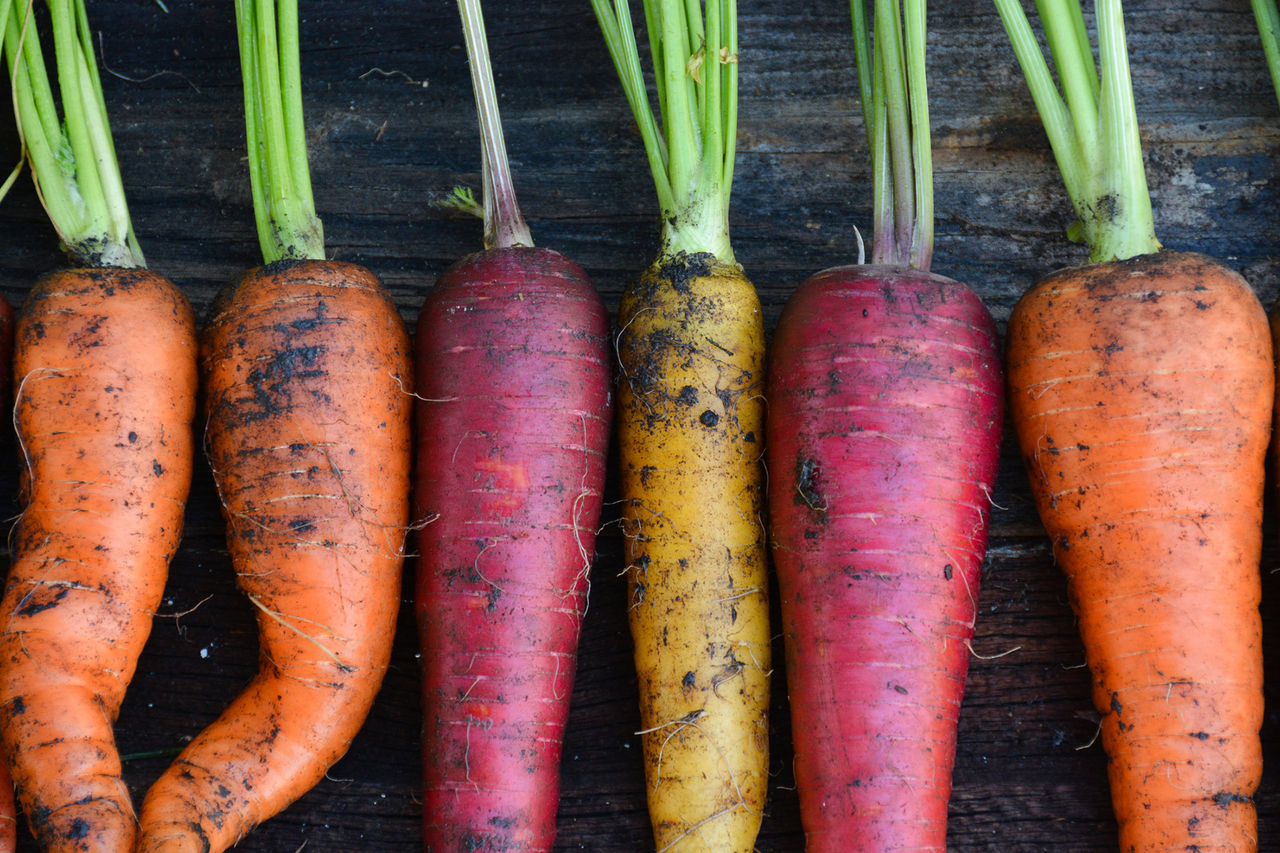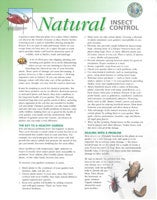
To some, the idea of organic gardening is simply avoiding synthetic (man-made) fertilizers and pesticides. For many others, it goes further, working with nature to produce a healthy garden by incorporating or mimicking aspects of natural ecosystems and applying other safe techniques to create balance.
Why Garden Organically?
Fighting Mother Nature is an uphill battle, which typically leads to an increasing dependence on synthetic fertilizers and pesticides. Not only can this gardening practice be bad for the environment, wildlife and human health, but it can also be expensive and time consuming as nature's garden helpers are driven from the garden through the creation of an unwelcoming environment.
Some overall benefits of organic gardening include
- Methods that help to keep our air, water and soil clean and healthy, which results in...
-
A safe garden for our family to enjoy, and also...
-
Our wild neighbours, both near and far, benefit, which means…
-
We then benefit from wildlife services such as pest management and pollination, plus...
-
Garden plants tend to be more vibrant, strong and lush than those grown using other gardening methods.
Ultimately, while there are different degrees of organic gardening, people do it as a natural or conscious reflection of their understanding that we are a part of nature and our existence depends upon a healthy planet. Some people’s motivations go further, beyond the desire for our own well-being to the respect and support for the life that surrounds and supports us and all living things on our planet.
Whatever your level of interest, time or resources, read on to see how you can apply some of these benefits to your garden and learn the details of why it is so helpful.
How to Garden Organically
Organic gardening basically includes
-
Building up the soil as it becomes depleted
-
Encouraging biodiversity with a variety of plants that are home to a variety of animals
-
Creating and maintaining the garden in a manner that supports its organisms
-
Dealing with potential and existing problems in a safe and gentle manner, starting with prevention
Caring for the Soil
The first step in creating a dynamic garden is to create or maintain healthy soil which serves two main purposes. Good quality soil is teeming with important organisms that break down matter into usable nutrients for plant roots. This biodiversity that exists below ground level is key to growing vibrantly healthy plants. Healthy soil also means its texture reduces or eliminates the need to water your garden.
In nature, nutrients are continually returning to the soil in the form of decaying plant and animal matter. This maintains healthy plants, which are more able to deter and resist pests and diseases, as well as be more robust and look more vibrant.
In our quest to have tidy gardens, we often neglect to give back to the soil or do so with synthetic fertilizers. These products can be too strong and harm beneficial organisms in the soil but can also be too quick a dose for plants, acting like steroids do on humans. They can also harm our waterways, as rainwater carries residue to our groundwater, streams and rivers and ultimately our oceans. This impacts the quality of the water we use for drinking, cleaning and swimming. It also impacts the health of the aquatic life that depends upon a clean, safe habitat.
Natural fertilizers like compost, leaf mould, aged manure or even nettle tea nourish the soil and therefore your plants without any harm to the surrounding environment. Many are also soil amendments with organic matter (something that was once living), which build up the soil—allowing in air, retaining moisture, which is good for your plants, and preventing runoff, which helps other environments.
Mulching your garden beds with natural materials like wood chips, straw or leaves will not only suppress weeds, retain moisture in hot weather, prevent soil erosion and maintain suitable temperatures, but also returns nutrients as they slowly break down.
Grasscycling—leaving clippings where they lie—will return nutrients to the soil, provided your lawn has sufficient microorganisms to do the job. If not, add a sprinkling of compost once or twice a year to replenish and support these important garden allies.
Plant It and They Will Come
Growing a diversity of plants and plant types such as trees, shrubs, vines, flowering perennials, ferns and grasses will encourage biodiversity above ground level. This myriad of beneficial insects, birds and other creatures will use these plants as food, homes or temporary shelter. This habitat will also allow them to feed on species that could be problematic if left unchecked.
It is also helpful to mix them up, as large expanses of a single vegetable crop or flowering plant makes it easier for pests to find and feed.
Incorporate some regionally native plants, as they evolved with other local wildlife as well as the local weather conditions.
Creating and Maintaining the Organic Garden
Certain practices in creating and maintaining a garden can go a long way to support one’s organic efforts. For instance, correctly placing a plant in an area that matches its preferred growing conditions of light, soil and moisture increases the chances of your plant not only surviving but also thriving. In addition to promoting healthy soil, this further minimizes the need for pesticides or synthetic fertilizers, which can negatively impact our environment, near and far.
Another way to garden organically is to pay attention to your plants as you stroll through your garden, keeping an eye out for potential weed-, pest- or disease-related problems. The sooner any challenges are addressed, the easier the solution tends to be.
Prevention can also include removing weeds when they are young and the soil moist, as in the spring or after a good rain, as this makes removal easier. Prevention can also involve removing diseased plant material from the garden or allowing more space between those plants that need plenty of air circulation to keep mildew at bay.
You can take organic gardening a step further and conserve your water usage with some of the above-mentioned features of mulch and soil amendment, but also with rain barrels, watering plants in the morning and at ground level. You can also add to your plant’s health—and save on your water bill as well as minimize negative impacts associated with excessive water usage.
Try your hand at composting and make your own “gardener’s gold.” Look at your lawn and see how much you need for your lifestyle’s various activities and then decide which areas you can replace with more natural, life-supporting habitat. This will not only help your garden, but also minimize the resources required in maintaining a lawn. Also, consider how you will maintain the remaining lawn, with the option of not watering it and allowing it to go dormant in the summer (if that is what it would do in your region) and see if it’s feasible to use a push mower to keep it trim! There are even varieties of grass that are suited to mowing only once per month.
Dealing With Problems
If you have applied all the prevention ideas above, chances are you won’t need to reach for insecticides or herbicides. But if a problem does crop up, try the ideas mentioned below and keep in mind the organic principle to start with the gentlest remedy first.
Deter insects on your crops with floating row covers that are light enough to let in sunlight but prevent intruders from landing on plants. For larger animals, keep them out of certain areas of your garden with fencing. Alternatively, put up deterrents such as pie plates or other objects that can easily blow in a breeze to startle hungry animals. Other deterrents work because of their smell, like a garlic/egg mixture or sweaty clothes which can keep a variety of animals away. Other means of deterring pests (and maximizing nutrients) can be done with the help of companion planting—grouping or pairing plants together to meet nutrient needs and/or repel pests.
Also consider handpicking small bugs or spraying pests with water. If a few goes at this doesn’t work and you find that you can’t live with the results, add a small amount of mild, environmentally friendly detergent. Keep in mind that many products may say they are gentle, but reading labels and asking questions will help separate the cream from the crop. If that doesn’t work, try an organic pesticide or trap, such as beer for slugs. Keep in mind, however, that the cycle of many pests include some temporary damage to a plant, which naturally allows that plant to regenerate later in the season for its own purposes. A little research can go a long way in saving you time year after year with recurring situations.
Our Natural Insect Control handout, Problem Wildlife and Lawn Care sections have lots of detailed information on this.
There are so many ways to work with instead of against nature, and the benefits include a garden that is vital and self-supporting. So why not put a bit of thought into how you build your garden, letting Mother Nature take care of it for you while you sit back and relax?
|
The Problem With Pesticides Think of your garden as a small ecosystem — all the living organisms exist in balance. When we introduce pesticides (chemicals designed to kill), we alter this balance in two ways: First, pesticides often harm organisms other than those targeted as they contaminate the air, water and soil. This can kill off or weaken a variety of important species such as pollinating insects. These beneficial insects are important to the health of our gardens. Pesticides have also been known to reduce the health of other species, such as birds, which generally pick up the toxins through ingesting polluted food. The range of damage can be far reaching as pesticides can travel to distant ecosystems in the air or water. Second, the very action of pesticides wipes out certain insect or weed populations which removes the food supply for a variety of animals. Butterfly populations dwindle when their food sources disappear through herbicide use. Many birds, frogs, toads, bats, and other animals depend on a good supply of insects to remain healthy – including hummingbirds who need a certain amount of spiders and insects for protein! Why not allow these animals to keep your insect populations under control naturally?
|
- 0







